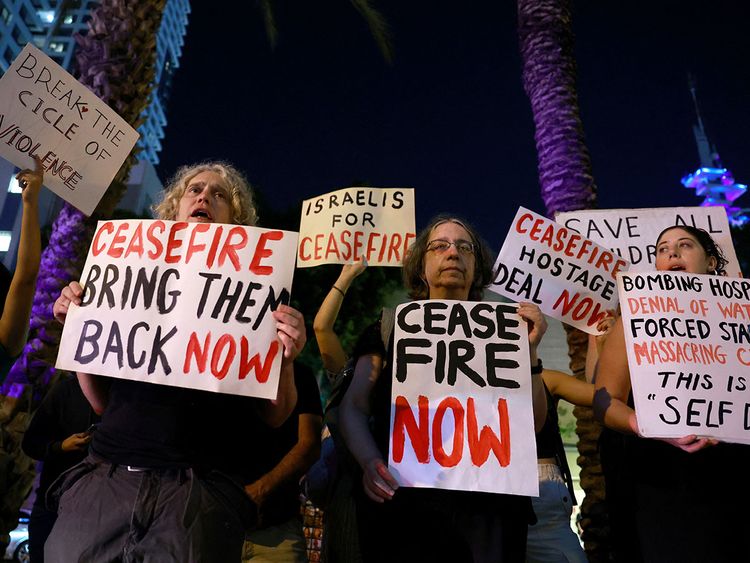Jerusalem: Israel and Hamas announced a deal on Wednesday allowing at least 50 hostages and scores of Palestinian prisoners to be freed, while offering besieged Gaza residents a four-day truce after weeks of all-out war.
In the first major diplomatic breakthrough in the war, Israel, Hamas, the United States and Qatar sketched in a series of statements a carefully sequenced agreement that has been weeks in the making.
Under the Qatar-brokered deal, Palestinian militants will release 50 women and children kidnapped during their October 7 raids, in which Israel says 1,200 people were killed, most of them civilians. A senior US official said three Americans, including three-year-old Abigail Mor Idan, were among the 50 earmarked for staggered release from Thursday.
Qatar’s foreign ministry confirmed the deal, saying that “a number of Palestinian women and children detained in Israeli prisons” would be released in exchange for the hostages.
The humanitarian pause will also allow the entry of a larger number of humanitarian convoys and relief aid, including fuel designated for humanitarian needs.
The statement also said that the State of Qatar affirms its commitment to ongoing diplomatic efforts to de-escalate tensions, stop the bloodshed, and protect civilians. In this regard, the State of Qatar appreciates the efforts of the Arab Republic of Egypt and the United States of America in reaching this agreement.
“The starting time of the pause will be announced within the next 24 hours and last for four days, subject to extension,” the ministry said in a statement.
Hamas and other Palestinian militant groups are believed to be holding an estimated 240 Israelis and foreigners hostage in Gaza.
Israel said that to facilitate the hostage release it would initiate a four-day “pause” in its six-week-old air, land and sea assault of Gaza, but stressed this did not spell the end of the war.
For every 10 additional hostages released, there would be an extra day’s “pause”, the Israeli government said.
Hamas released a statement welcoming the “humanitarian truce” and said it would also see 150 Palestinians released from Israeli jails.
“The resistance is committed to the truce as long as the occupation honours it,” a Hamas official told AFP.
Sources from Hamas and Islamic Jihad, another militant group that took part in the October 7 attacks, had earlier told AFP the truce would include a ceasefire on the ground and a pause in Israeli air operations over southern Gaza.
Israel launched Operation “Swords of Iron” in Gaza in retaliation for the worst attacks in its history, vowing to secure the release of the hostages and to destroy Hamas.
According to the Hamas government in Gaza, the war has killed 14,100 people, thousands of them children.
Israeli Prime Minister Benjamin Netanyahu’s cabinet approved the accord Wednesday after a near-all-night meeting, in which he told reticent ministers this was a “difficult decision but it’s a right decision.”
The cabinet’s sign-off was one of the last stumbling blocks after what one US official described as five “extremely excruciating” weeks of talks involving the US Central Intelligence Agency, Israel’s overseas spy agency Mossad, Egyptian intelligence, and leaders in Doha, Cairo, Washington, Gaza and Israel.
Misgivings
Ahead of the cabinet vote, Netanyahu had faced a revolt from within his right-wing coalition, some of whom believe it gave too much to the Palestinian militants they have vowed to crush.
Hardline Minister for National Security Itamar Ben-Gvir signaled he would vote against the agreement, saying it should include the release of Israeli soldiers also taken by Hamas.
But with dozens of families in Israel who are beyond desperate to have their loved ones returned home, and the Israeli public gripped by the hostages’ fate, the government ultimately set aside any misgivings.
Israel’s hawkish Defense Minister Yoav Gallant said before the crunch meeting that he had won assurances that the deal would not spell the end of the war to destroy Hamas.
“Immediately after we have exhausted this phase” he said, security operations would “continue in full force.”
In a statement, the Israeli government underscored that the truce agreement would not mean the end of the war in Gaza.
Israel “will continue the war in order to return home all of the hostages, complete the elimination of Hamas and ensure that there will be no new threat to the State of Israel from Gaza,” a government statement said.
Israel, Hamas agree on four-day truce, hostage release and humanitarian aid into Gaza
The ceasefire will also allow the entry of a larger number of relief aid into Gaza
157


